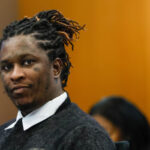The nation remembered the life and achievements of Dr. Martin Luther King Jr. Today. Forty-three years have passed since the legendary civil rights leader was assassinated at a hotel in Memphis on the eve of a protest march. King and his wife, Coretta Scott King, are buried close to his childhood home in Atlanta.
King would have turned 82-years-old this January.
At age 35, he was the youngest person to have won the Nobel Peace prize.
Martin Luther King Jr. Day was first celebrated in 1986. The annual federal holiday falls on the third Monday in January.
On Sept. 20, 1958, Martin Luther King Jr. was signing copies of his first book, Stride Toward Freedom, at a Harlem bookstore when a deranged woman stabbed him in the chest. As King later recounted, “the tip of the blade was on the edge of my aorta, the main artery. And once that’s punctured, you drown in your own blood — that’s the end of you.”
King recalled the incident in his last sermon before his assassination. Speaking in Memphis on April 3, 1968, at the headquarters of the Church of God in Christ, King said:
“It came out in the New York Times the next morning, that if I had sneezed, I would have died.”
He then went on to talk about some of the letters from well-wishers he received at the time, including “one from the president and the vice president.” But while he did not remember exactly what all those letters said, he did vividly remember one:
“It said simply, ‘Dear Dr. King: I am a ninth-grade student at the White Plains High School.’ She said, ‘While it should not matter, I would like to mention that I am a white girl. I read in the paper of your misfortune, and of your suffering. And I read that if you had sneezed, you would have died. And I’m simply writing you to say that I’m so happy that you didn’t sneeze.'”
King went on to use that letter to make the central point in his final sermon:
And I want to say tonight, I want to say that I am happy that I didn’t sneeze. Because if I had sneezed, I wouldn’t have been around here in 1960, when students all over the South started sitting-in at lunch counters. And I knew that as they were sitting in, they were really standing up for the best in the American dream. And taking the whole nation back to those great wells of democracy which were dug deep by the Founding Fathers in the Declaration of Independence and the Constitution. If I had sneezed, I wouldn’t have been around in 1962, when Negroes in Albany, Georgia, decided to straighten their backs up. And whenever men and women straighten their backs up, they are going somewhere, because a man can’t ride your back unless it is bent. If I had sneezed, I wouldn’t have been here in 1963, when the black people of Birmingham, Alabama, aroused the conscience of this nation, and brought into being the Civil Rights Bill. If I had sneezed, I wouldn’t have had a chance later that year, in August, to try to tell America about a dream that I had had. If I had sneezed, I wouldn’t have been down in Selma, Alabama, to see the great movement there. If I had sneezed, I wouldn’t have been in Memphis to see a community rally around those brothers and sisters who are suffering. I’m so happy that I didn’t sneeze.
There are many things worth contemplating here, but focus for a moment on his reference to “those great wells of democracy which were dug deep by the Founding Fathers in the Declaration of Independence and the Constitution.” We live at a moment when references to our founding documents, particularly the Constitution, have a decidedly partisan and ideological ring and tend to be offered by those who are politically conservative. But as King shows here, many who revere the Constitution do so because they see its adoption as the first step down a long road to a more comprehensive and inclusive democracy. The Constitution is rooted, as Supreme Court Justice Stephen Breyer has argued, in the idea of “active liberty.” King was exactly right to see both the Declaration and the Constitution as “those great wells of democracy.”
The most celebrated and tragic lines from King’s Memphis sermon are also worth remembering on this day.
I just want to do God’s will. And He’s allowed me to go up to the mountain. And I’ve looked over. And I’ve seen the promised land. I may not get there with you. But I want you to know tonight, that we, as a people will get to the promised land. And I’m happy, tonight. I’m not worried about anything. I’m not fearing any man. Mine eyes have seen the glory of the coming of the Lord.
We will get to the promised land. And we can be grateful, along with that girl from White Plains, that Dr. King was granted an extra decade of life to bring us a bit closer.

![Da Brat Marries Judy Dupart on 2.22.22 [PHOTOS]](https://hiphopucit.com/wp-content/uploads/2022/02/1645669184565-440x264.jpeg)
![Drake Reveals Photos of His Son Adonis [Photos]](https://hiphopucit.com/wp-content/uploads/2020/03/Drake-and-on-Adonis-HHUCIT.jpg)

![Megan Thee Stallion – “BOA” [NEW VIDEO]](https://hiphopucit.com/wp-content/uploads/2024/05/Megan_Thee_Stallion___BOA__Official_Video__1_12_screenshot-440x264.jpg)
![Doechii Feat. JT – “Alter Ego” [NEW VIDEO]](https://hiphopucit.com/wp-content/uploads/2024/05/Screenshot-of-Doechii-and-JTs-Al-440x264.png)
![Young Thug Feat. Drake Drop – “Oh U Went” [NEW VIDEO]](https://hiphopucit.com/wp-content/uploads/2023/07/Young-Thug-and-Drake-1014x570-1-440x264.png)


![Boston Officials Confirm Two Deaths at Boston Marathon Explosion [VIDEO]](https://hiphopucit.com/wp-content/uploads/2013/04/130415160314-boston-marathon-explosion-04-c1-main.jpg)




